Burt A. The Evolution of the British Empire and Commonwealth From the American Revolution
Подождите немного. Документ загружается.

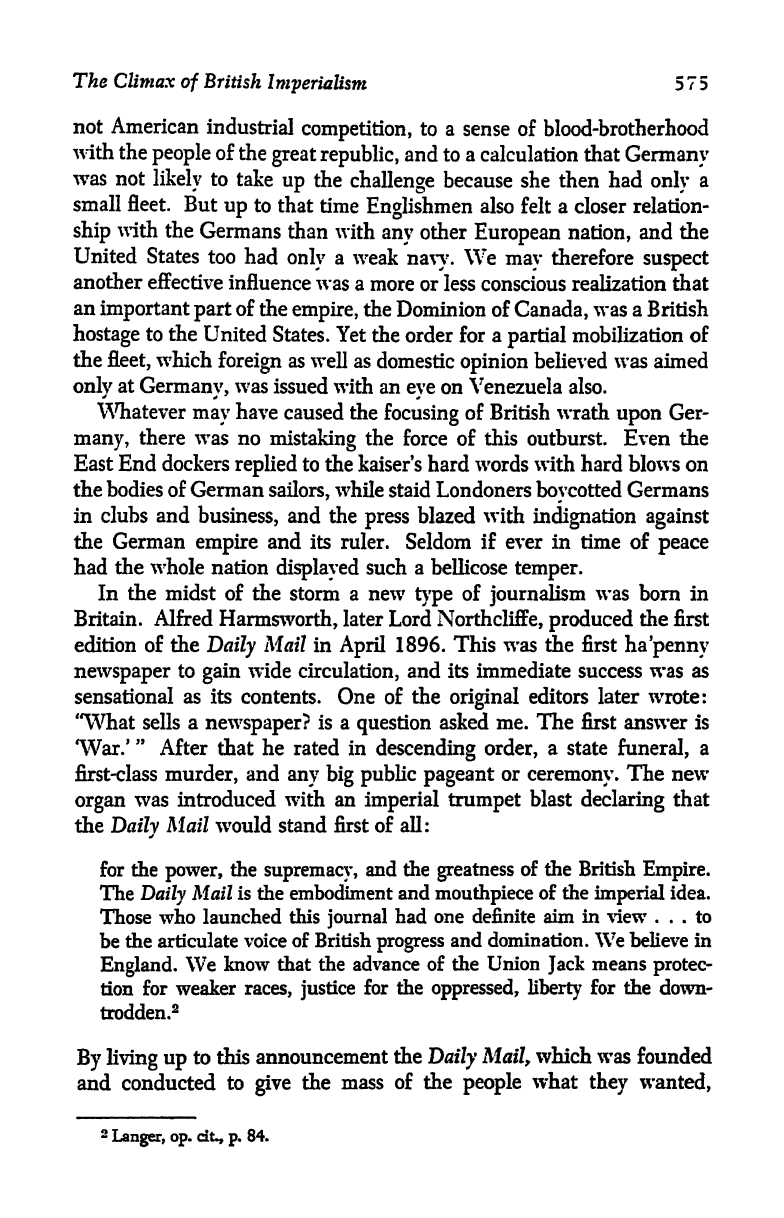
The
Climax
of
British
Imperialism
575
not American
industrial
competition,
to
a
sense
of blood-brotherhood
with
the
people
of
the
great republic,
and
to
a
calculation
that
Germany
was not
likely
to
take
up
the
challenge
because she then
had
only
a
small
fleet.
But
up
to that
time
Englishmen
also felt a
closer
relation-
ship
with the
Germans than
with
any
other
European
nation,
and the
United States
too
had
only
a
weak
navy.
We
may
therefore
suspect
another
effective
influence
was a
more or less
conscious
realization
that
an
important
part
of the
empire,
the
Dominion of
Canada,
was a British
hostage
to
the
United
States.
Yet
the
order for
a
partial
mobilization of
the
fleet,
which
foreign
as
well
as
domestic
opinion
believed
was aimed
only
at
Germany,
was
issued
with an
eye
on
Venezuela also.
Whatever
may
have
caused
the
focusing
of British wrath
upon
Ger-
many,
there
was
no
mistaking
the
force of
this outburst. Even
the
East End dockers
replied
to the kaiser's hard
words
with hard blows on
the bodies of
German
sailors,
while staid Londoners
boycotted
Germans
in clubs and
business,
and the
press
blazed with
indignation against
the German
empire
and
its
ruler. Seldom
if
ever in time
of
peace
had
the whole nation
displayed
such
a
bellicose
temper.
In
the
midst of the storm a new
type
of
journalism
was
born
in
Britain. Alfred
Harmsworth,
later Lord
Northcliffe,
produced
the
first
edition
of the
Daily
Mail
in
April
1896. This was the
first
ha'penny
newspaper
to
gain
wide
circulation,
and its immediate success was
as
sensational
as
its
contents.
One
of the
original
editors later wrote:
"What sells a
newspaper?
is a
question
asked me. The
first
answer is
War/
"
After that he rated in
descending
order,
a
state
funeral,
a
first-class
murder,
and
any
big
public
pageant
or
ceremony.
The
new
organ
was introduced
with an
imperial trumpet
blast
declaring
that
the
Daily
Mail would stand first of
all:
for the
power,
the
supremacy,
and the
greatness
of the British
Empire.
The
Daily
Mail
is the embodiment and
mouthpiece
of
the
imperial
idea.
Those
who launched
this
journal
had one
definite aim in view ...
to
be
the
articulate voice
of British
progress
and
domination.
We believe in
England.
We
know
that the advance of
the Union
Jack
means
protec-
tion
for weaker
races,
justice
for the
oppressed, liberty
for the
down-
trodden.
2
By
living
up
to
this announcement
the
Daily
Mail,
which was founded
and
conducted
to
give
the
mass
of
the
people
what
they
wanted,
2
Langer,
op.
cit.,
p.
84.
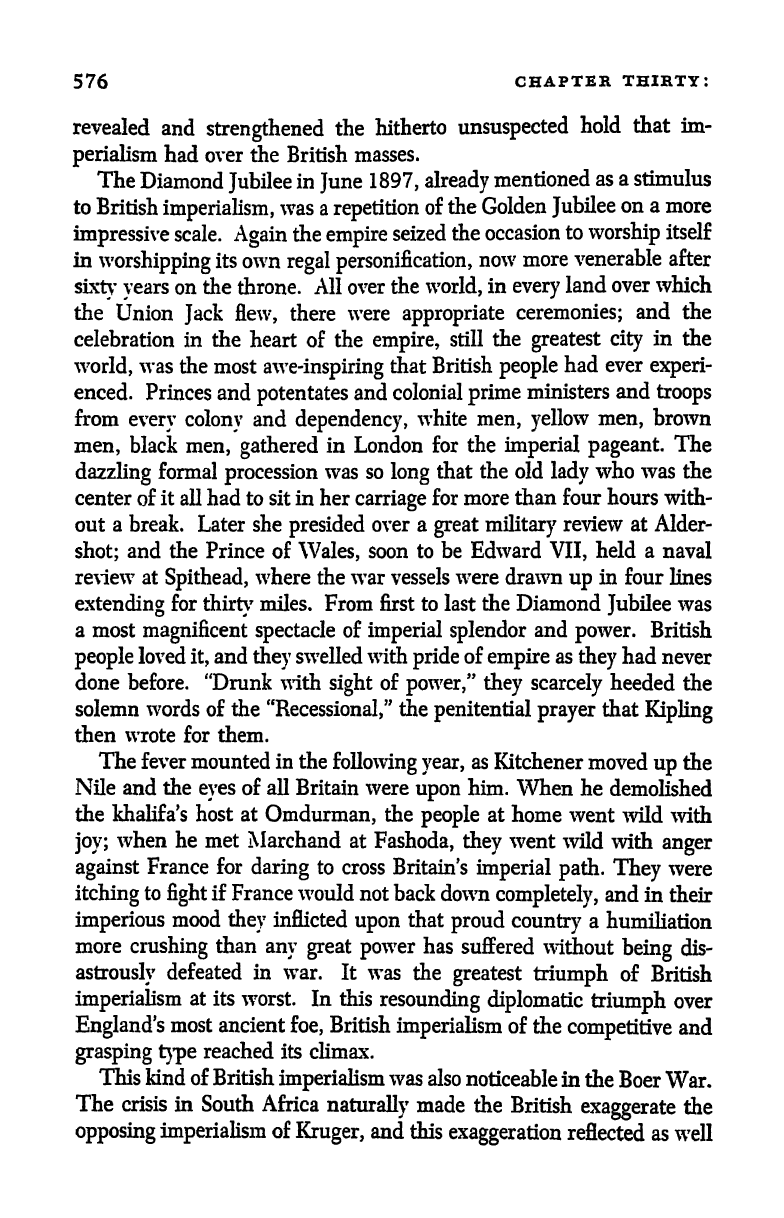
576
CHAPTER
THIRTY:
revealed
and
strengthened
the
hitherto
unsuspected
hold
that im-
perialism
had
over
die
British
masses.
The
Diamond
Jubilee
in
June
1897,
already
mentioned
as
a
stimulus
to
British
imperialism,
was a
repetition
of
the
Golden
Jubilee
on a
more
impressive
scale.
Again
the
empire
seized
the occasion
to
worship
itself
in
worshipping
its
own
regal
personification,
now
more
venerable
after
sixty
years
on
the
throne.
All
over
the
world,
in
every
land
over
which
the
Union
Jack
flew,
there
were
appropriate
ceremonies;
and the
celebration in the
heart of
the
empire,
still
the
greatest
city
in
the
world,
was
the most
awe-inspiring
that
British
people
had
ever
experi-
enced.
Princes
and
potentates
and colonial
prime
ministers
and
troops
from
every colony
and
dependency,
white
men,
yellow
men,
brown
men,
black
men,
gathered
in London
for the
imperial
pageant.
The
dazzling
formal
procession
was
so
long
that
the
old
lady
who was
the
center
of
it
all had to sit
in
her
carriage
for more than
four
hours with-
out
a
break.
Later
she
presided
over
a
great
military
review at
Alder-
shot;
and
the
Prince
of
Wales,
soon
to be
Edward
VII,
held
a
naval
review
at
Spithead,
where
the war
vessels
were
drawn
up
in
four
lines
extending
for
thirty
miles. From
first to
last
the
Diamond
Jubilee
was
a
most
magnificent
spectacle
of
imperial
splendor
and
power.
British
people
loved
it,
and
they
swelled
with
pride
of
empire
as
they
had
never
done
before. "Drunk with
sight
of
power," they
scarcely
heeded
the
solemn words of the
"Recessional,"
the
penitential
prayer
that
Kipling
then
wrote for
them.
The fever mounted
in
the
following year,
as
Kitchener
moved
up
the
Nile and
the
eyes
of all Britain
were
upon
him.
When he
demolished
the khalifa's host
at
Omdurman,
the
people
at
home went
wild
with
joy;
when he met
Marchand
at
Fashoda,
they
went
wild
with
anger
against
France for
daring
to cross Britain's
imperial
path.
They
were
itching
to
fight
if France
would not
back
down
completely,
and
in their
imperious
mood
they
inflicted
upon
that
proud
country
a
humiliation
more
crushing
than
any
great power
has
suffered
without
being
dis-
astrously
defeated
in war.
It was
the
greatest
triumph
of
British
imperialism
at its
worst.
In
this
resounding
diplomatic
triumph
over
England's
most
ancient
foe,
British
imperialism
of
the
competitive
and
grasping type
reached
its climax.
This kind of
British
imperialism
was
also
noticeable in
the
Boer
War.
The crisis in
South Africa
naturally
made
the
British
exaggerate
the
opposing
imperialism
of
Kruger,
and
this
exaggeration
reflected
as
well
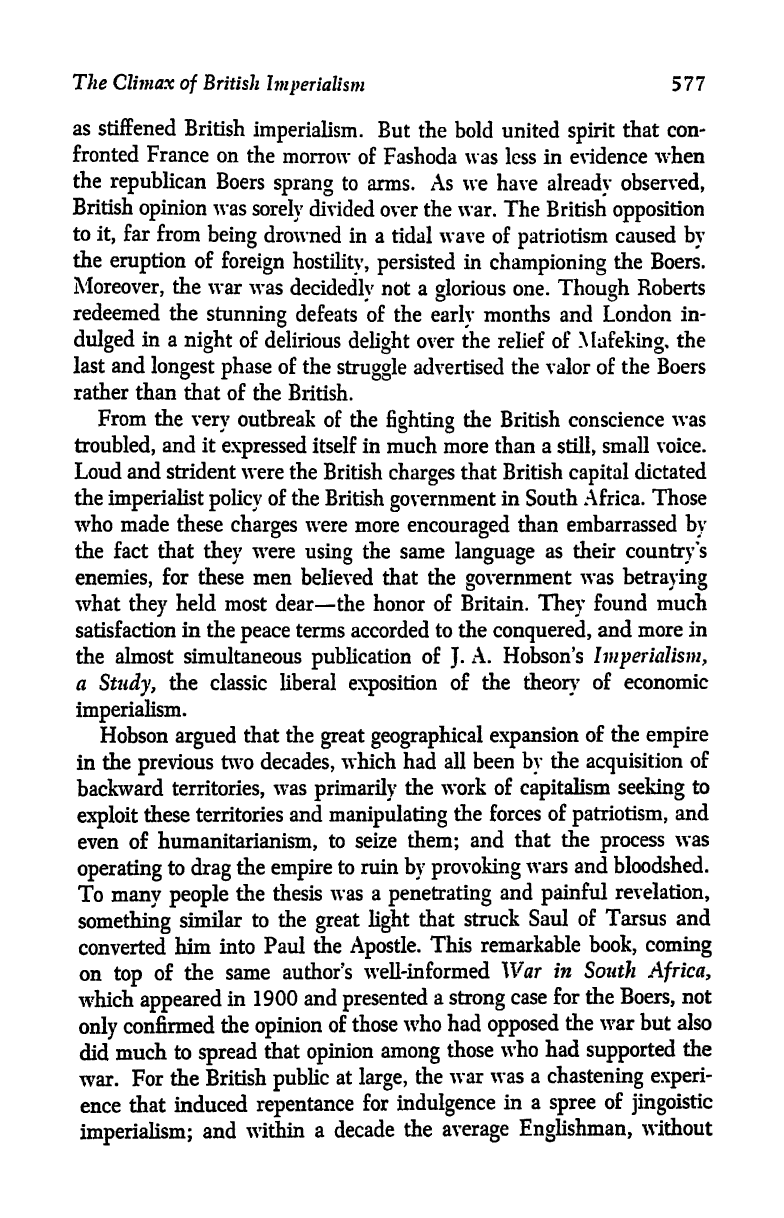
The Climax
of
British
Imperialism
577
as stiffened
British
imperialism.
But the
bold
united
spirit
that con-
fronted
France on
the
morrow
of
Fashoda \vas less in
evidence
when
the
republican
Boers
sprang
to
arms. As we have
already
observed,
British
opinion
was
sorely
divided over the war. The British
opposition
to
it,
far
from
being
drowned
in
a
tidal wave
of
patriotism
caused
by
the
eruption
of
foreign
hostility,
persisted
in
championing
the Boers.
Moreover,
the
war
was
decidedly
not a
glorious
one.
Though
Roberts
redeemed
the
stunning
defeats of the
early
months
and London
in-
dulged
in
a
night
of
delirious
delight
over
the relief of
Maf
eking,
the
last and
longest
phase
of
the
struggle
advertised
the
valor
of
the
Boers
rather than
that of
the
British.
From the
very
outbreak
of the
fighting
the
British
conscience
was
troubled,
and
it
expressed
itself
in
much more
than a
still,
small voice.
Loud
and strident
were
the
British
charges
that
British
capital
dictated
the
imperialist
policy
of
the
British
government
in
South
Africa.
Those
who
made
these
charges
were
more
encouraged
than
embarrassed
by
the fact that
they
were
using
the same
language
as their
country's
enemies,
for these men
believed that the
government
was
betraying
what
they
held most dear the honor of
Britain.
They
found
much
satisfaction
in the
peace
terms
accorded
to the
conquered,
and more
in
the
almost simultaneous
publication
of
J.
A.
Hobson's
Imperialism,
a
Study,
the classic
liberal
exposition
of
the
theory
of economic
imperialism.
Hobson
argued
that the
great
geographical
expansion
of
the
empire
in
the
previous
two
decades,
which had all
been
by
the
acquisition
of
backward
territories,
was
primarily
the
work
of
capitalism seeking
to
exploit
these territories
and
manipulating
the
forces
of
patriotism,
and
even
of
humanitarianism,
to seize
them;
and
that
the
process
was
operating
to
drag
the
empire
to
ruin
by provoking
wars and bloodshed.
To
many people
the
thesis was
a
penetrating
and
painful
revelation,
something
similar
to
the
great
light
that
struck Saul
of
Tarsus and
converted
him
into
Paul
the
Apostle.
This remarkable
book,
coming
on
top
of
the
same
author's
well-informed
War
in
South
Africa,
which
appeared
in
1900
and
presented
a
strong
case for
the
Boers,
not
only
confirmed
the
opinion
of
those
who had
opposed
the
war
but
also
did
much
to
spread
that
opinion
among
those
who
had
supported
the
war.
For
the
British
public
at
large,
the
war was
a
chastening
experi-
ence
that
induced
repentance
for
indulgence
in
a
spree
of
jingoistic
imperialism;
and
within
a decade
the
average
Englishman,
without
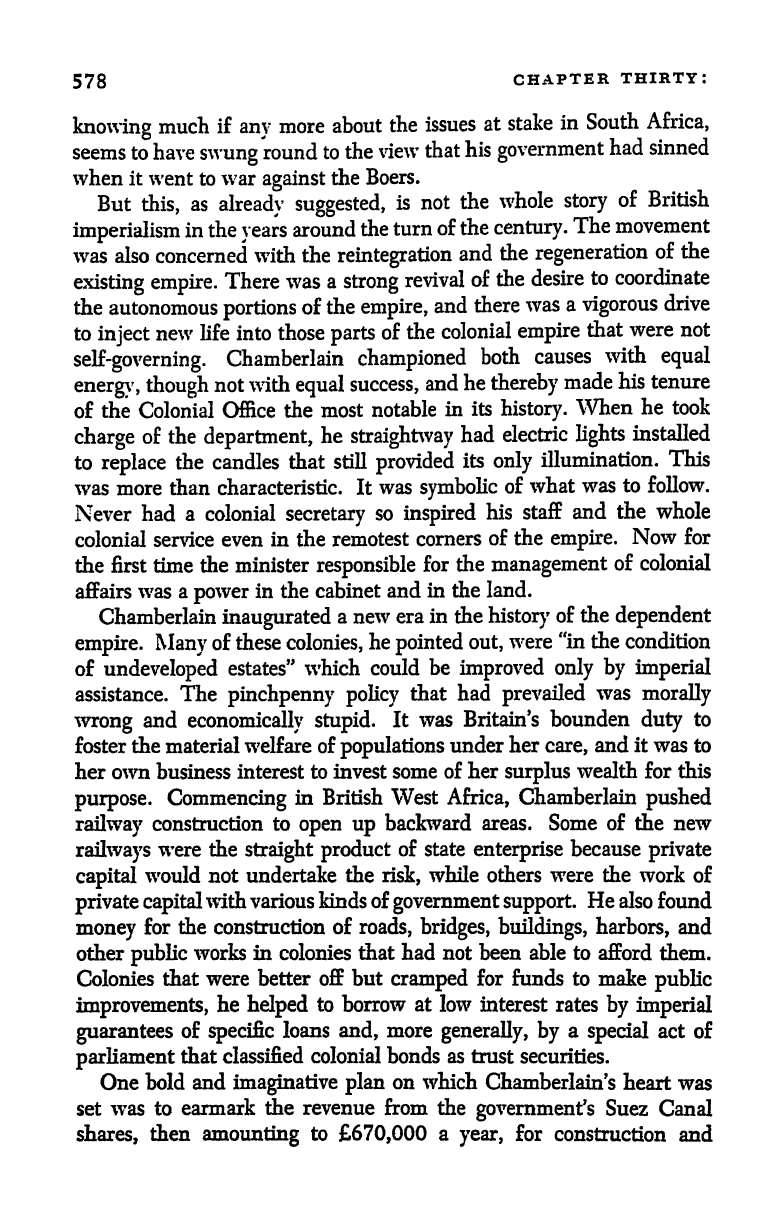
578
CHAPTER
THIRTY:
knowing
much
if
any
more
about
the
issues
at
stake
in South
Africa,
seems to have
swung
round
to
the
view
that
his
government
had sinned
when it
went to
war
against
the
Boers.
But
this,
as
already suggested,
is
not
the
whole
story
of
British
imperialism
in the
years
around
the
turn
of
the
century.
The
movement
was
also
concerned
with
the
reintegration
and
the
regeneration
of
the
existing
empire.
There
was
a
strong
revival
of
the
desire
to coordinate
the autonomous
portions
of
the
empire,
and
there
was
a
vigorous
drive
to
inject
new life
into those
parts
of
the
colonial
empire
that
were not
self-governing.
Chamberlain
championed
both
causes
with
equal
energy,
though
not
with
equal
success,
and
he
thereby
made
his tenure
of
the
Colonial
Office
the most
notable
in
its
history.
When
he took
charge
of
the
department,
he
straightway
had
electric
lights
installed
to
replace
the candles
that
still
provided
its
only
illumination.
This
was
more
than characteristic.
It
was
symbolic
of
what
was to follow.
Never had
a
colonial
secretary
so
inspired
his staff
and
the whole
colonial
sendee
even in the remotest
corners
of the
empire.
Now for
the
first time the minister
responsible
for
the
management
of
colonial
affairs was
a
power
in the cabinet
and
in the
land.
Chamberlain
inaugurated
a
new
era
in
the
history
of
the
dependent
empire.
Many
of these
colonies,
he
pointed
out,
were "in
the
condition
of
undeveloped
estates"
which
could
be
improved
only
by
imperial
assistance.
The
pinchpenny
policy
that had
prevailed
was
morally
wrong
and
economically
stupid.
It
was
Britain's bounden
duty
to
foster
the material welfare of
populations
under
her
care,
and it was
to
her own
business
interest to invest
some
of her
surplus
wealth for this
purpose.
Commencing
in British West
Africa,
Chamberlain
pushed
railway
construction
to
open up
backward
areas. Some of the new
railways
were the
straight
product
of state
enterprise
because
private
capital
would not
undertake the
risk,
while
others
were the
work of
private
capital
with
various
kinds of
government
support.
He
also found
money
for
the
construction
of
roads,
bridges, buildings,
harbors,
and
other
public
works in colonies that had not been
able
to
afford them.
Colonies
that were better
off but
cramped
for funds
to make
public
improvements,
he
helped
to borrow
at low
interest rates
by
imperial
guarantees
of
specific
loans
and,
more
generally, by
a
special
act of
parliament
that classified colonial bonds
as
trust securities.
One
bold
and
imaginative
plan
on
which
Chamberlain's heart
was
set was
to
earmark the
revenue
from the
government's
Suez
Canal
shares,
then
amounting
to
670,000
a
year,
for
construction and
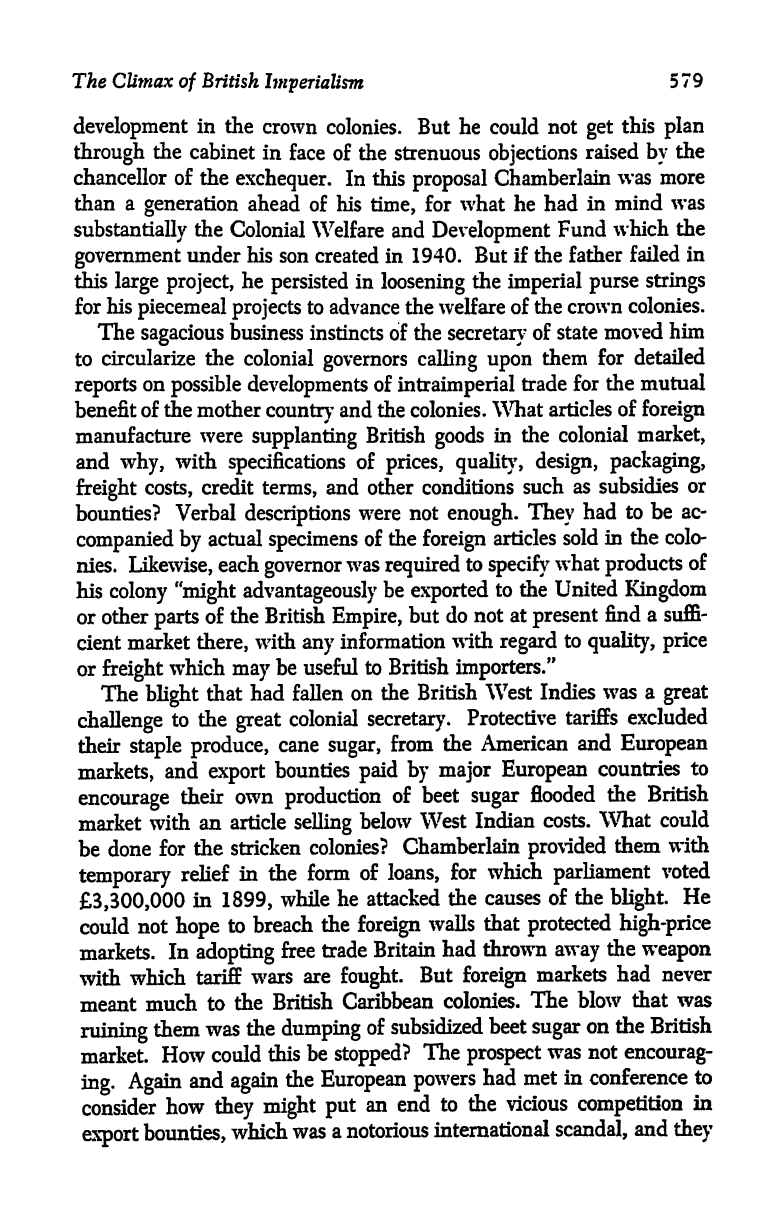
The Climax
of
British
Imperialism
579
development
in the
crown
colonies.
But he could
not
get
this
plan
through
the
cabinet
in
face
of the strenuous
objections
raised
by
the
chancellor of
the
exchequer.
In
this
proposal
Chamberlain
was
more
than
a
generation
ahead
of his
time,
for what he
had
in
mind
was
substantially
the
Colonial
Welfare and
Development
Fund
which
the
government
under his
son
created
in 1940.
But if
the father
failed in
this
large
project,
he
persisted
in
loosening
the
imperial
purse
strings
for
his
piecemeal projects
to advance the welfare of
the crown
colonies.
The
sagacious
business
instincts of
the
secretary
of
state
moved
him
to
circularize the
colonial
governors
calling
upon
them for
detailed
reports
on
possible developments
of
intraimperial
trade
for
the
mutual
benefit
of
the mother
country
and the
colonies.
What
articles
of
foreign
manufacture
were
supplanting
British
goods
in the
colonial
market,
and
why,
with
specifications
of
prices,
quality,
design,
packaging,
freight
costs,
credit
terms,
and other conditions
such
as subsidies
or
bounties?
Verbal
descriptions
were not
enough.
They
had to be
ac-
companied
by
actual
specimens
of
the
foreign
articles
sold
in
the
colo-
nies.
Likewise,
each
governor
was
required
to
specify
what
products
of
his
colony
"might
advantageously
be
exported
to
the
United
Kingdom
or
other
parts
of
the British
Empire,
but
do
not at
present
find
a suffi-
cient
market
there,
with
any
information
with
regard
to
quality,
price
or
freight
which
may
be
useful to
British
importers."
The
blight
that
had fallen
on
the British
West
Indies
was a
great
challenge
to the
great
colonial
secretary.
Protective
tariffs
excluded
their
staple produce,
cane
sugar,
from
the
American
and
European
markets,
and
export
bounties
paid
by
major
European
countries
to
encourage
their own
production
of beet
sugar
flooded
the
British
market
with
an
article
selling
below West
Indian
costs.
What
could
be done
for
the stricken
colonies?
Chamberlain
provided
them
with
temporary
relief
in
the form
of
loans,
for
which
parliament
voted
3,300,000
in
1899,
while
he
attacked the
causes of
the
blight.
He
could
not
hope
to
breach
the
foreign
walls
that
protected
high-price
markets.
In
adopting
free
trade
Britain
had
thrown
away
the
weapon
with
which
tariff
wars
are
fought.
But
foreign
markets
had
never
meant
much
to
the
British
Caribbean
colonies.
The blow
that was
ruining
them
was
the
dumping
of
subsidized
beet
sugar
on
the British
market.
How
could
this
be
stopped?
The
prospect
was not
encourag-
ing.
Again
and
again
the
European
powers
had
met
in
conference
to
consider
how
they
might
put
an end
to
the
vicious
competition
in
export
bounties,
which
was
a notorious
international
scandal,
and
they
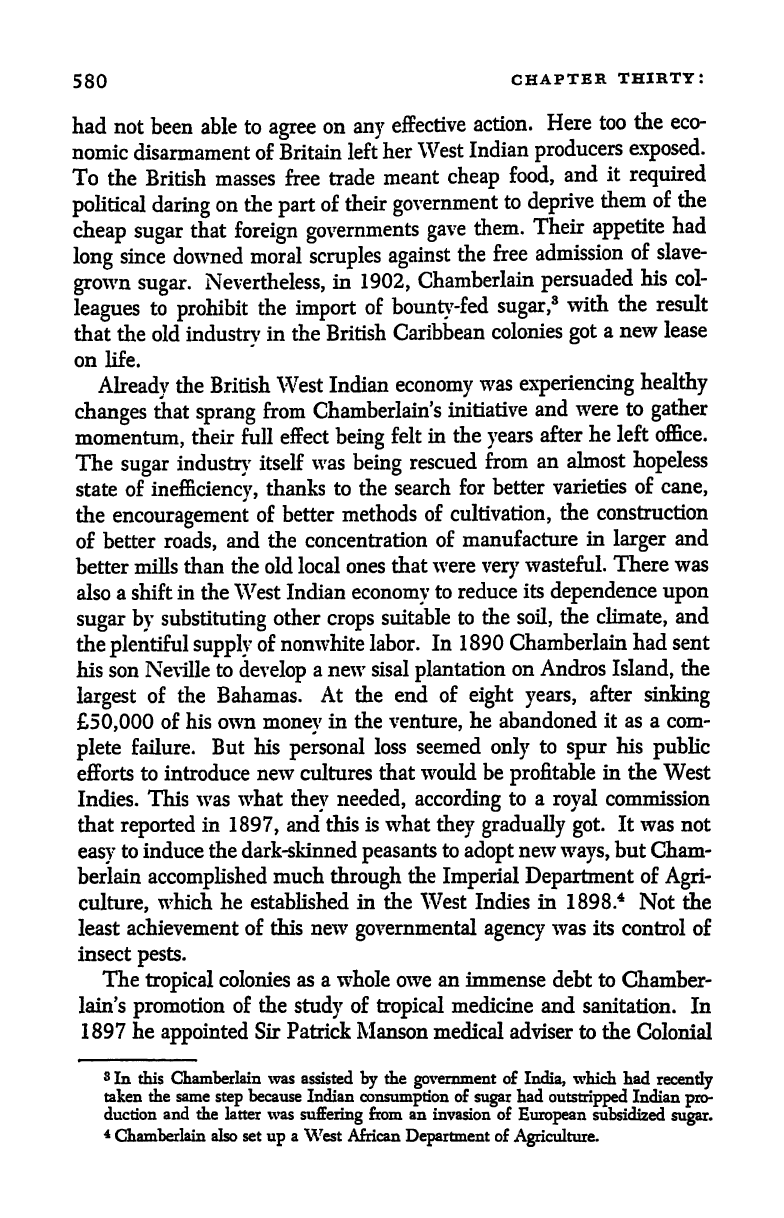
580
CHAPTER
THIRTY:
had
not been able to
agree
on
any
effective
action.
Here
too
the
eco-
nomic
disarmament
of
Britain left
her
West
Indian
producers
exposed.
To
the
British masses
free
trade
meant
cheap
food,
and
it
required
political
daring
on
the
part
of
their
government
to
deprive
them
of the
cheap
sugar
that
foreign
governments
gave
them.
Their
appetite
had
long
since downed
moral
scruples
against
the
free
admission
of slave-
grown
sugar.
Nevertheless,
in
1902,
Chamberlain
persuaded
his
col-
leagues
to
prohibit
the
import
of
bounty-fed
sugar,
3
with the result
that the old
industry
in the
British
Caribbean
colonies
got
a
new lease
on
life.
Already
the
British West
Indian
economy
was
experiencing
healthy
changes
that
sprang
from Chamberlain's
initiative
and
were
to
gather
momentum,
their full
effect
being
felt
in
the
years
after
he left office.
The
sugar
industry
itself
was
being
rescued
from
an almost
hopeless
state of
inefficiency,
thanks to
the
search
for
better
varieties
of
cane,
the
encouragement
of
better
methods
of
cultivation,
the
construction
of better
roads,
and the
concentration
of
manufacture
in
larger
and
better
mills
than the old
local
ones
that
were
very
wasteful. There
was
also
a shift in the
West
Indian
economy
to reduce
its
dependence
upon
sugar by
substituting
other
crops
suitable
to
the
soil,
the
climate,
and
the
plentiful
supply
of
nonwhite
labor.
In 1890
Chamberlain
had sent
his son Neville
to
develop
a new sisal
plantation
on Andros
Island,
the
largest
of the
Bahamas.
At the end of
eight
years,
after
sinking
50,000
of his
own
money
in the
venture,
he
abandoned
it as a com-
plete
failure.
But his
personal
loss
seemed
only
to
spur
his
public
efforts
to
introduce
new
cultures
that would be
profitable
in the West
Indies.
This was
what
they
needed,
according
to
a
royal
commission
that
reported
in
1897,
and
this is what
they
gradually
got.
It
was not
easy
to induce
the dark-skinned
peasants
to
adopt
new
ways,
but Cham-
berlain
accomplished
much
through
the
Imperial Department
of
Agri-
culture,
which
he
established
in the West Indies in 1898.
4
Not
the
least
achievement
of this new
governmental agency
was
its control
of
insect
pests.
The
tropical
colonies
as
a
whole owe
an
immense
debt
to
Chamber-
lain's
promotion
of
the
study
of
tropical
medicine
and
sanitation. In
1897
he
appointed
Sir
Patrick
Manson medical adviser to
the
Colonial
3
In this
Chamberlain
was
assisted
by
the
government
of
India,
which
had
recently
taken
the same
step
because Indian
consumption
of
sugar
had
outstripped
Indian
pro-
duction
and
the latter was
suffering
from an
invasion
of
European
subsidized
sugar.
4
Chamberlain
also set
up
a
West African
Department
of
Agriculture.
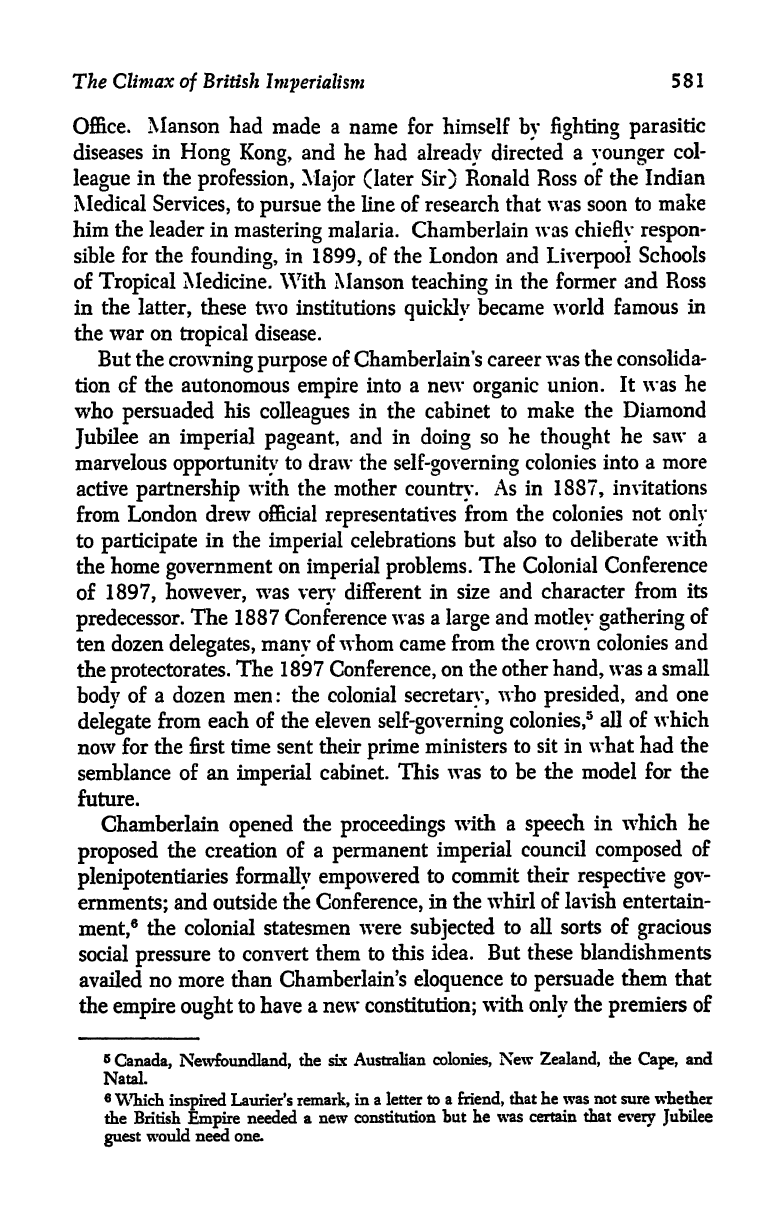
The Climax
of
British
Imperialism
581
Office.
Manson
had
made
a
name for himself
by fighting
parasitic
diseases
in
Hong
Kong,
and
he
had
already
directed
a
younger
col-
league
in the
profession,
Major
(later Sir)
Ronald
Ross
of
the
Indian
Medical
Services,
to
pursue
the line
of
research that
was
soon
to
make
him
the leader
in
mastering
malaria. Chamberlain
was
chiefly
respon-
sible
for the
founding,
in
1899,
of
the
London and
Liverpool
Schools
of
Tropical
Medicine.
With
Manson
teaching
in the former
and
Ross
in
the
latter,
these two
institutions
quickly
became
world
famous
in
the
war
on
tropical
disease.
But the
crowning
purpose
of
Chamberlain's
career was
the consolida-
tion
of the
autonomous
empire
into
a
new
organic
union.
It was
he
who
persuaded
his
colleagues
in the cabinet to
make
the Diamond
Jubilee
an
imperial
pageant,
and
in
doing
so he
thought
he
saw
a
marvelous
opportunity
to
draw
the
self-governing
colonies
into
a more
active
partnership
with the
mother
country.
As
in
1887,
invitations
from
London
drew official
representatives
from
the colonies
not
only
to
participate
in the
imperial
celebrations
but
also to
deliberate
with
the
home
government
on
imperial problems.
The
Colonial
Conference
of
1897,
however,
was
very
different in
size and
character from
its
predecessor.
The 1887
Conference
was a
large
and
motley
gathering
of
ten
dozen
delegates,
many
of
whom came from
the crown colonies
and
the
protectorates.
The
1897
Conference,
on
the other
hand,
was a
small
body
of
a
dozen men
:
the colonial
secretary,
who
presided,
and one
delegate
from
each
of the
eleven
self-governing
colonies,
5
all of
which
now for
the first
time sent their
prime
ministers
to sit in what had
the
semblance
of
an
imperial
cabinet.
This
was
to
be the model for
the
future.
Chamberlain
opened
the
proceedings
with a
speech
in
which
he
proposed
the creation of
a
permanent
imperial
council
composed
of
plenipotentiaries
formally
empowered
to commit
their
respective
gov-
ernments;
and outside
the
Conference,
in
the whirl
of lavish entertain-
ment,
6
the
colonial
statesmen
were
subjected
to all sorts of
gracious
social
pressure
to convert
them to
this
idea.
But these blandishments
availed no more
than Chamberlain's
eloquence
to
persuade
them
that
the
empire
ought
to have
a new
constitution;
with
only
the
premiers
of
5
Canada, Newfoundland,
the six
Australian
colonies,
New
Zealand,
the
Cape,
and
Natal.
6
Which
inspired
Laurier's
remark,
in a letter
to
a
friend,
that he was
not
sure whether
the
British
Empire
needed
a
new constitution
hut he
was
certain
that
every
Jubilee
guest
would need one.
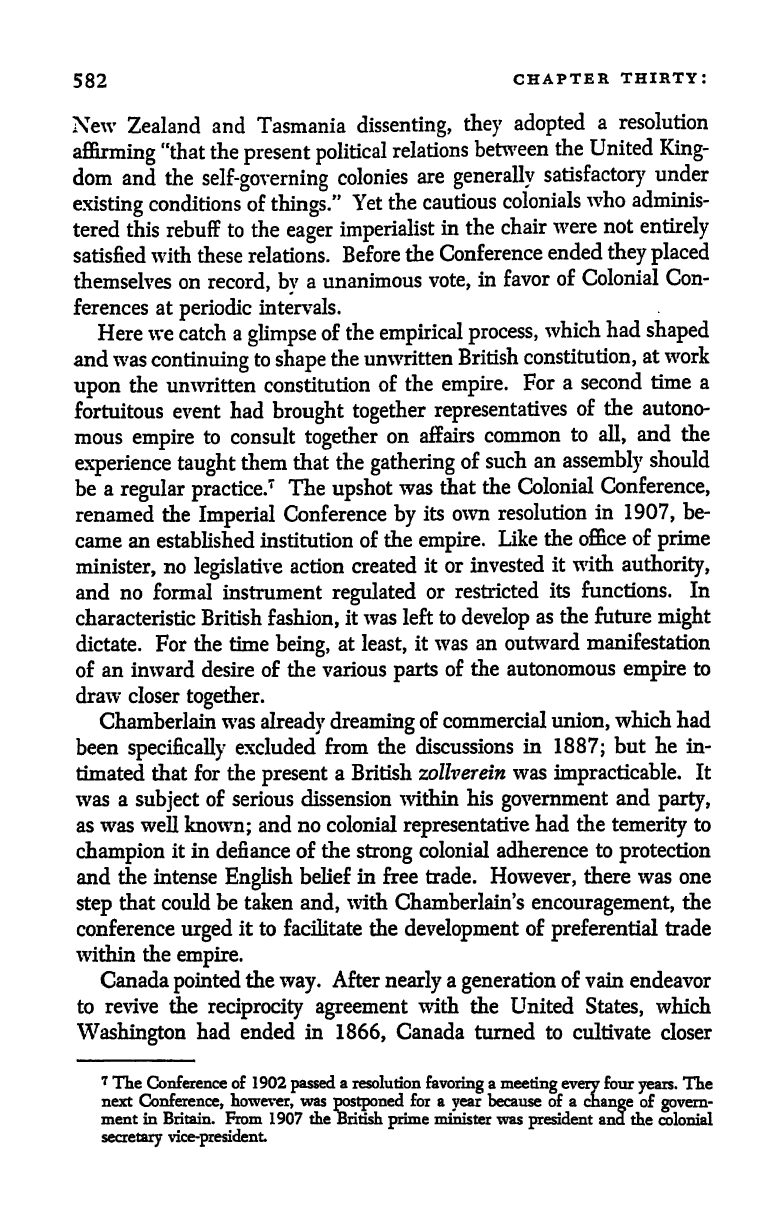
582
CHAPTER
THIRTY:
New
Zealand and
Tasmania
dissenting,
they
adopted
a resolution
affirming
"that
the
present political
relations
between
the
United
King-
dom
and the
self-governing
colonies
are
generally
satisfactory
under
existing
conditions of
things."
Yet
the
cautious
colonials
who adminis-
tered
this rebuff to
the
eager
imperialist
in
the
chair
were not
entirely
satisfied with these
relations.
Before
the
Conference
ended
they placed
themselves on
record,
by
a
unanimous
vote,
in favor
of
Colonial Con-
ferences at
periodic
intervals.
Here we
catch a
glimpse
of
the
empirical
process,
which
had
shaped
and was
continuing
to
shape
the
unwritten
British
constitution,
at work
upon
the
unwritten constitution
of
the
empire.
For
a
second
time a
fortuitous event
had
brought
together
representatives
of
the
autono-
mous
empire
to consult
together
on
affairs
common
to
all,
and the
experience taught
them
that
the
gathering
of
such
an
assembly
should
be
a
regular
practice,
7
The
upshot
was
that
the
Colonial
Conference,
renamed the
Imperial
Conference
by
its own
resolution
in
1907,
be-
came an
established
institution
of
the
empire.
Like
the office
of
prime
minister,
no
legislative
action
created
it or
invested
it
with
authority,
and no formal instrument
regulated
or
restricted
its
functions. In
characteristic
British
fashion,
it was left
to
develop
as
the
future
might
dictate. For
the time
being,
at
least,
it
was
an
outward
manifestation
of
an
inward
desire
of the various
parts
of
the autonomous
empire
to
draw closer
together.
Chamberlain
was
already
dreaming
of commercial
union,
which
had
been
specifically
excluded
from the discussions
in
1887;
but
he
in-
timated that for
the
present
a
British zollverein
was
impracticable.
It
was a
subject
of serious dissension
within
his
government
and
party,
as was
well
known;
and
no colonial
representative
had
the
temerity
to
champion
it in defiance of
the
strong
colonial
adherence to
protection
and
the intense
English
belief
in
free trade.
However,
there
was one
step
that could be
taken
and,
with
Chamberlain's
encouragement,
the
conference
urged
it
to facilitate the
development
of
preferential
trade
within
the
empire.
Canada
pointed
the
way.
After
nearly
a
generation
of vain
endeavor
to
revive lie
reciprocity
agreement
with
the
United
States,
which
Washington
had ended in
1866,
Canada turned to
cultivate closer
7
The
Conference
of
1902
passed
a
resolution
favoring
a
meeting
everv four
years.
The
next
Conference,
however,
was
postponed
for a
year
because of
a
change
of
govern-
ment in
Britain.
From 1907
the
British,
prime
minister
was
president
and
the colonial
secretary
vice-president.
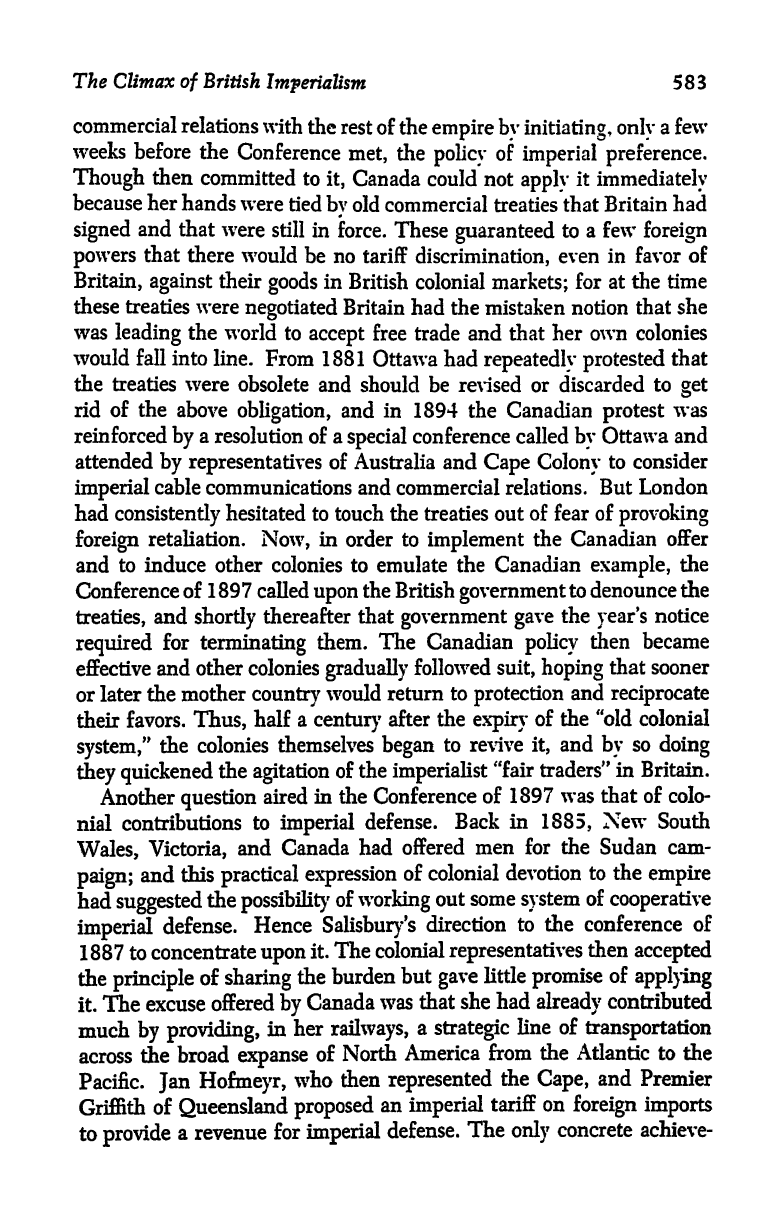
The Climax
of
British
Imperialism
583
commercial relations
with
the
rest of the
empire by
initiating,
only
a few
weeks
before the
Conference
met,
the
policy
of
imperial preference.
Though
then
committed to
it,
Canada could
not
apply
it
immediately
because her
hands
were
tied
by
old
commercial treaties
that
Britain
had
signed
and that
were still
in
force. These
guaranteed
to
a few
foreign
powers
that
there
would
be no tariff
discrimination,
even
in favor
of
Britain,
against
their
goods
in
British colonial
markets;
for
at the
time
these treaties were
negotiated
Britain
had
the mistaken notion
that she
was
leading
the
world to
accept
free trade and
that her own colonies
would fall into
line.
From
1881
Ottawa had
repeatedly protested
that
the treaties were
obsolete
and
should be
revised
or
discarded
to
get
rid
of
the
above
obligation,
and
in 1894 the Canadian
protest
was
reinforced
by
a
resolution
of
a
special
conference called
by
Ottawa
and
attended
by
representatives
of Australia and
Cape
Colony
to consider
imperial
cable
communications and
commercial
relations.
But London
had
consistently
hesitated to
touch
the treaties out of fear
of
provoking
foreign
retaliation.
Now,
in
order to
implement
the Canadian
offer
and
to induce other colonies to emulate the Canadian
example,
the
Conference
of
1
897
called
upon
the
British
government
to
denounce
the
treaties,
and
shortly
thereafter that
government gave
the
year's
notice
required
for
terminating
them. The Canadian
policy
then became
effective
and
other colonies
gradually
followed
suit,
hoping
that
sooner
or
later
the mother
country
would
return
to
protection
and
reciprocate
their
favors.
Thus,
half a
century
after
the
expiry
of the "old colonial
system,"
the
colonies
themselves
began
to
revive
it,
and
by
so
doing
they
quickened
the
agitation
of
the
imperialist
"fair traders" in
Britain.
Another
question
aired
in the
Conference
of
1897
was
that of colo-
nial
contributions
to
imperial
defense.
Back in
1885,
New
South
Wales,
Victoria,
and Canada
had
offered
men for
the
Sudan
cam-
paign;
and
this
practical
expression
of colonial devotion
to
the
empire
had
suggested
the
possibility
of
working
out
some
system
of
cooperative
imperial
defense.
Hence
Salisbury's
direction
to
the conference of
1887
to
concentrate
upon
it.
The colonial
representatives
then
accepted
the
principle
of
sharing
the burden
but
gave
little
promise
of
applying
it.
The
excuse
offered
by
Canada
was
that she
had
already
contributed
much
by providing,
in
her
railways,
a
strategic
line
of
transportation
across
the
broad
expanse
of
North
America
from
the Atlantic to
the
Pacific.
Jan
Hofoneyr,
who
then
represented
the
Cape,
and
Premier
Griffith
of
Queensland
proposed
an
imperial
tariff on
foreign imports
to
provide
a revenue
for
imperial
defense.
The
only
concrete achieve-
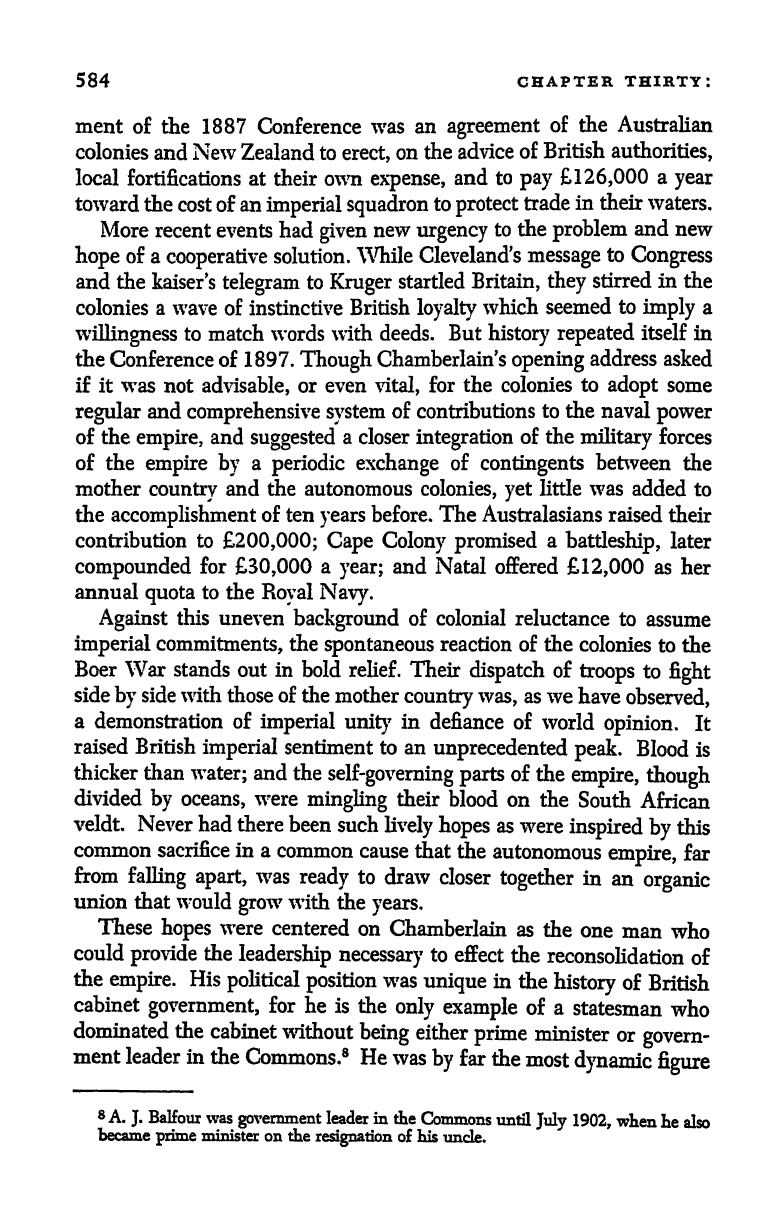
584 CHAPTER
THIRTY:
ment
of
the 1887
Conference
was
an
agreement
of
the Australian
colonies
and
New
Zealand
to
erect,
on
the
advice
of
British
authorities,
local
fortifications
at
their
own
expense,
and to
pay
126,000
a
year
toward
the
cost of an
imperial
squadron
to
protect
trade
in their
waters.
More
recent
events
had
given
new
urgency
to the
problem
and new
hope
of
a
cooperative
solution.
"While
Cleveland's
message
to
Congress
and
the
kaiser's
telegram
to
Kruger
startled
Britain,
they
stirred
in
the
colonies
a
wave
of
instinctive
British
loyalty
which
seemed
to
imply
a
willingness
to match
words
with
deeds.
But
history
repeated
itself
in
the Conference
of
1897.
Though
Chamberlain's
opening
address
asked
if
it
was
not
advisable,
or
even
vital,
for
the
colonies
to
adopt
some
regular
and
comprehensive system
of
contributions
to
the
naval
power
of the
empire,
and
suggested
a
closer
integration
of
the
military
forces
of
the
empire by
a
periodic exchange
of
contingents
between
the
mother
country
and
the
autonomous
colonies,
yet
little was
added
to
the
accomplishment
of ten
years
before.
The
Australasians raised
their
contribution to
200,000;
Cape Colony promised
a
battleship,
later
compounded
for
30,000
a
year;
and
Natal offered
12,000
as
her
annual
quota
to
the
Royal
Navy.
Against
this uneven
background
of colonial
reluctance to
assume
imperial
commitments,
the
spontaneous
reaction of the
colonies
to the
Boer War
stands out in
bold relief.
Their
dispatch
of
troops
to
fight
side
by
side
with
those of the
mother
country
was,
as we
have
observed,
a
demonstration
of
imperial
unity
in
defiance
of
world
opinion.
It
raised
British
imperial
sentiment to
an
unprecedented
peak.
Blood is
thicker than
water;
and
the
self-governing
parts
of the
empire,
though
divided
by
oceans,
were
mingling
their
blood on
the
South
African
veldt. Never
had
there
been
such
lively
hopes
as
were
inspired
by
this
common
sacrifice in a
common
cause
that the
autonomous
empire,
far
from
falling
apart,
was
ready
to draw
closer
together
in
an
organic
union that
would
grow
with
the
years.
These
hopes
were
centered on
Chamberlain
as
the
one
man
who
could
provide
the
leadership
necessary
to
effect
the
reconsolidation
of
the
empire.
His
political
position
was
unique
in
the
history
of
British
cabinet
government,
for
he
is
the
only
example
of
a
statesman
who
dominated the
cabinet
without
being
either
prime
minister
or
govern-
ment
leader in
the
Commons.
8
He
was
by
far
the
most
dynamic
figure
8
A.
J.
Balfour was
government
leader in
the
Commons
until
July
1902,
when
he
also
became
prime
minister on
the
resignation
of his
uncle.
